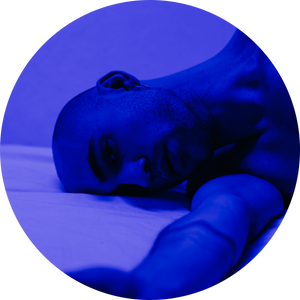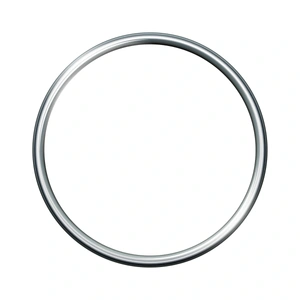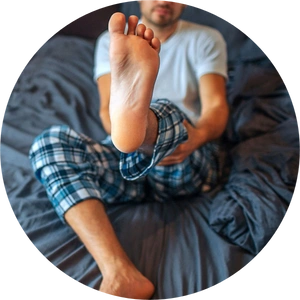What is Blue Light?
Blue light is the term used to describe the shortest wavelength seen by the human eye. It is all around us, with ⅓ of all visible light being blue light.
Humans have always been exposed to blue light, with the sun emitting most natural blue light during daylight hours. But society has become inundated with an influx of artificial blue light over the past century with the invention of televisions, smartphones, LED lights, and other digital screens.
Our circadian rhythm – the internal clock that dictates our natural processes – is heavily influenced by blue light. In recent years the amount of blue light emitted from digital screens has raised the question of how excess blue light affects our bodies, or specifically, our sleep.
According to the 2023 Digital Report, Americans spend an average of more than 10 hours a day in front of a screen.
How Blue Light Disrupts Sleep
Blue light is present during daylight hours from the sun, which has trained our bodies to associate it with being awake. Therefore, being around devices that emit blue light after the sun sets can be detrimental to sleep.
Researchers have found that blue light suppresses the production of melatonin – an important sleep hormone. Decreased levels of melatonin lead to difficulty falling asleep and disrupted sleep patterns.
The problem stems from the use of light-emitting (LE) devices close to bedtime, after the sun sets. A 2014 study found that individuals who read using an LE-eBook took longer to fall asleep, reported reduced sleepiness in the evening, and were less alert the next morning than when reading a printed book next to a dim lamp.
If you have trouble sleeping every now and then, there isn’t much cause for concern. But, when blue light leads to chronic sleep disruption, there is the potential for long-term consequences including an increased risk of developing a sleep disorder.
Repeated sleep disruption has also been linked to chronic health conditions, such as heart disease, high blood pressure, diabetes, depression, and more.
If you are experiencing sleep disruption as a possible result of blue light exposure, be sure to seek advice from a licensed healthcare professional to start getting your sleep back on track.
The Impact of Blue Light on Sleep Quality
Not only can blue light exposure disrupt your slumber, but it can even affect the sleep that you are able to get.
A 2019 study found that blue light exposure directly before bedtime correlates to shallower sleep for shorter durations of time. Unsurprisingly, this is then linked to decreased focus and concentration the following morning, which can last all day.
Digital eye strain is another result of blue light exposure that can impact your quality of sleep. Working on a computer or watching television for several hours will make your eyes feel uncomfortable, adding strain to your vision. Eye strain is typically connected to headaches and neck pain, which will hinder your ability to get a good, comfortable night’s sleep.
Blue Light and Children’s Sleep
Children are constantly growing, and they require more sleep than adults (10 to 12 hours a night). Therefore, it is very important to consider the specific impact of blue light exposure on children’s sleep patterns.
The function of melatonin suppression from blue light is the same in children as it is in adults, but the intensity may be higher for children due to their eyes’ increased sensitivity to light. A 2014 study that tested melatonin suppression in adults and children from blue light found that the percentage of melatonin suppression in children was almost double of that in adults after being exposed to the same amount of blue light.
Because of children’s heightened sensitivity to light and their need for a full night’s rest, it is extremely important to be vigilant about limiting blue light exposure close to bedtime.
Promoting sleep hygiene at a young age is essential to maintaining healthy growth and developing habits that will last a lifetime.
Managing Blue Light Exposure
You don’t need to eliminate all screen time just to sleep through the night, but it’s certainly important to manage your blue light exposure in order to maximize your sleep quality and quantity.
The main priority is decreasing the use of digital screens after the sun goes down, which will allow your natural circadian rhythm to dictate your sleep schedule.
But shutting the computer right after sunset may not always be feasible. If you tend to use blue light-emitting devices at night, there are additional ways to limit the negative effects. Here are some recommendations:
-
Turn on night mode or use a blue light filter
-
Invest in blue light-blocking glasses or amber glasses
-
Take frequent breaks from the screen
Creating a Sleep-Friendly Environment
Getting a good night’s sleep takes more than shutting off the screen, especially if you’re used to low-quality sleep and several disruptions.
You can create a comfortable, sleep-friendly environment through the following actions:
-
Focusing on lighting: Warm-colored, dimmable lights and blackout curtains or shades will be incredibly beneficial in easing your body into a restful sleep
-
Reducing noise: Eliminating external factors that could contribute to noise — including ticking clocks or beeping electronics — will allow you to sleep in the quietest environment possible
-
Cooling the room: Turning the temperature down even slightly will do wonders for your sleep
-
Choosing a comfortable mattress and bedding: A no-brainer, but has to be said.
-
Establishing a bedtime routine: Though it doesn’t depend on the environment, having a consistent bedtime routine will let your body know when it is time to wind down for the day.
The Takeaway
There is no need to fear blue light during the day – of course, try not to excessively overdo it – but it is important to understand that the more you are exposed to it at night, the worse your sleep will be.
Depending on your situation, prescription sleep medication might be right for you. Check out REX MD today to get your sleep back on track.












